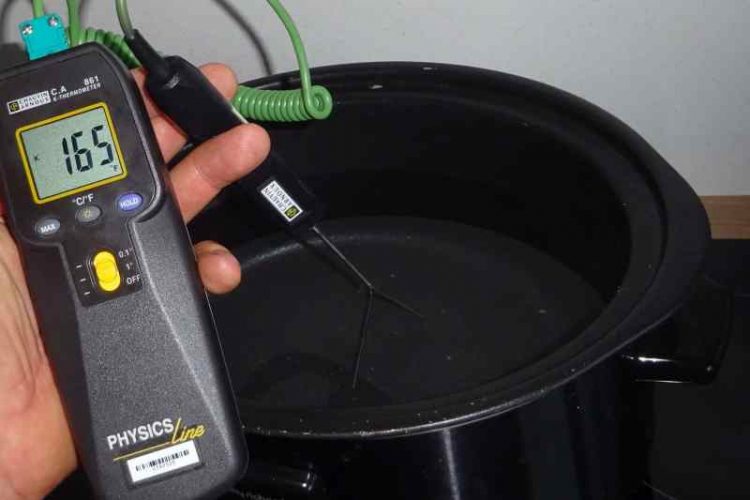The idea of Slow Cooking is to gently heat food to a temperature below the boiling temperature of the water. In fact, slow cookers or crock-pots have usually two or three temperature settings that regulate and maintain the cooking temperature over many hours between 65 to 95 degrees depending on the setting. Is the slow cooker not hot enough, the food will not be done in the estimated time. Is the slow cooker too hot, the food will boil and looses too much liquid, becomes dry and nutrients are destroyed.
Slow Cooker Not Hot Enough Or Too Hot – What Happens?
Cooking food in a slow cooker provides delicious, tasty results. It is a gentle cooking method in which, especially in vegetables, the existing nutritional values and vitamins are largely retained. In a slow cooker that gets too hot, those vitamins and nutrients are lost just as in regular cooking.
On the other hand, if a slow cooker is not hot enough, it takes much longer to cook. But even more of a concern is, a safe core temperature may not be reached.
This is especially important for meat, poultry, or fish to kill off any bacteria such as salmonella. Only when a core temperature of about 135 F is reached and maintained for about an hour, salmonella is killed. Higher temperatures reduce the time required to kill germs. At 165 degrees Fahrenheit, 15 minutes are enough. When it comes to killing pathogens in food both heat level and time affect the equation.
When to check the slow cooker temperatures?
- If in doubt that your slow cooker reaches the bactericidal temperature
- Dishes do not seem to cook or become done
- Vegetables are either too hard or too soft or completely mushy
- It bubbles inside the pot – then you do not really have to measure, because when it bubbles it is too hot
How to measure the temperature?
To measure the temperature of your slow cooker you only need:
- Your slow cooker
- A kitchen thermometer
- Water (or you check while cooking a meal)
Methode
- Fill the pot up to 3/4 with water
- Just switch it on and wait
- Measure the temperature every couple of hours
At the Low Setting, it should measure a temperature of about 165 degrees Fahrenheit. This is the minimum temperature that should be reached in order for germs to be killed.
The Medium Setting, the temperature is somewhere around 180 Fahrenheit.
On the High Setting, the temperature should be around 195 degrees Fahrenheit.
Some models have a “Keep Warm Mode“. Here you need to measure no less than 140 degrees Fahrenheit to prevent the proliferation of bacteria. You may either manually switch into that, or some slow cookers with timers switch into the keep warm mode after the set cooking time is over. It important is to maintain a food-safe minimum temperature.
What affects the temperature in a slow cooker?
There are a lot of variables that influence the temperature that the slow cooker heats up to:
- The fill level, about three/quarter full is what they are designed for
- Are the heating elements in the bottom or in the side walls
- The model has a built-in temperature control or continuous heating
- Food has different thermal conductivity depending on the water and fat content
- How often is the lid lifted, does it seal well (heat loss)
Slow Cooker Not Hot Enough, What to do?
There are many factors that influence the success of cooking. The right temperature is undoubtedly important. Equally important, however, is that you get to know your slow cooker.
- If the fill level is low, it may get a bit hotter. Fill more in the next time
- If the pot is really full, it may not get quite as hot as it should and the cooking time is longer. Reduce the amount of food you put in next time
Experiment and find out what the best fill level is with what kind of foodstuff, every dish cooks differently.
From a health point of view, you have a problem if your slow cooker does not thoroughly heat the ingredients to at least 165 degrees Fahrenheit. Because then bacteria might not be killed off.
A higher temperature is not that serious of a problem. It will reduce cooking time. But it will also destroy vitamins and nutrients, which is actually one of the benefits of slow cooking.
References:
Keep food safe with time and temperature control,
https://extension.umn.edu/food-service-industry/keep-food-safe-time-and-temperature-control
Webstaurant, Following Food Safety Temperatures,
https://www.webstaurantstore.com/article/29/following-food-safety-temperatures.html
FDA, Food Safety Temperatures,
https://www.fda.gov/food/buy-store-serve-safe-food/serving-safe-buffets

